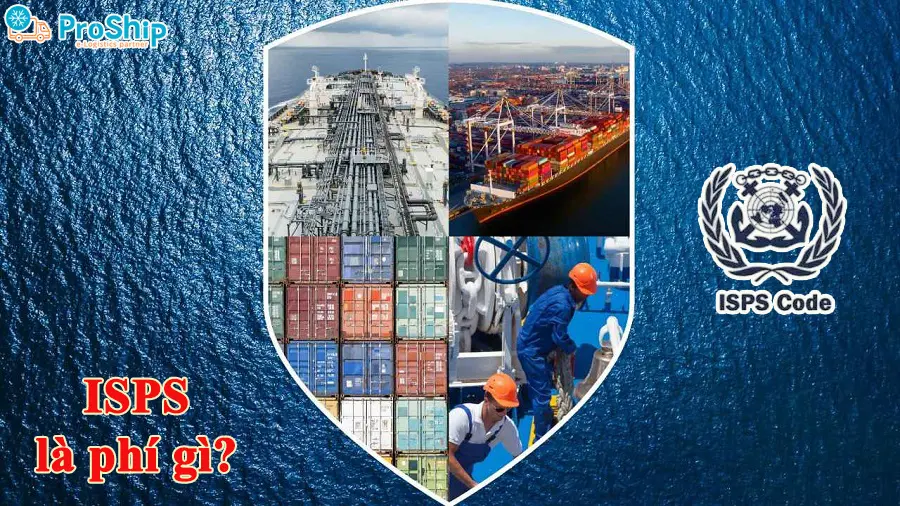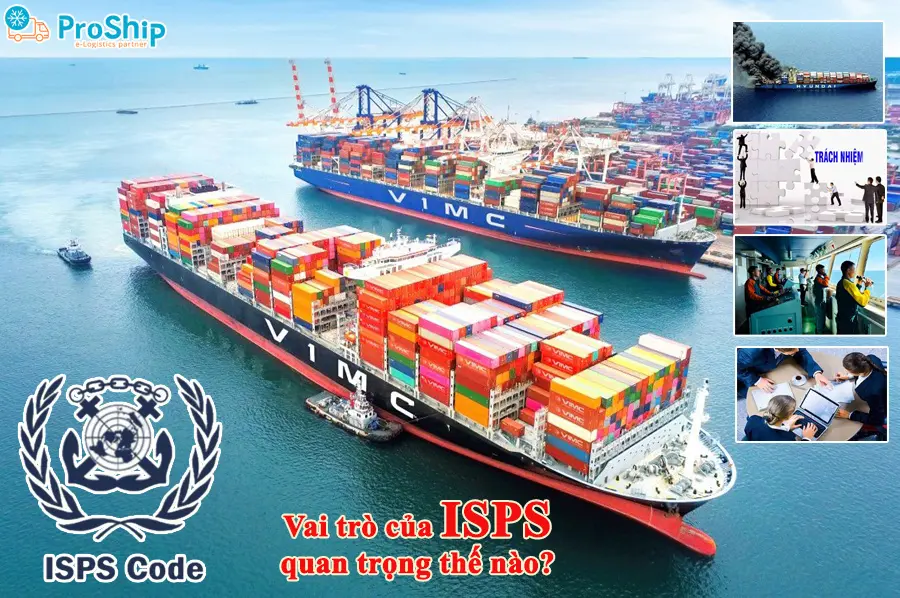x Bạn thắc mắc ISPS là phí gì trong vận chuyển hàng đường biển?
x Bạn quan tâm và muốn tìm hiểu về vai trò, nguồn gốc, yếu tố ảnh hưởng tới phụ phí ISPS là gì?
x Bạn muốn biết có mấy phụ phí ISPS và cước vận tải biển tính thế nào?
Proship.vn chúng tôi sẽ giải đáp thắc mắc ISPS là phí gì? Vai trò của phí ISPS trong xuất nhập khẩu là gì? Ai phải chi trả khoản phụ phí ISPS? Yếu tố nào ảnh hưởng trực tiếp tới phụ phí ISPS trong vận tải biển?…ngay sau đây.
ISPS là phí gì, nguồn gốc? Có mấy loại phí ISPS? Ai trả phí?
Cùng Proship tìm hiểu xem phí ISPS là gì, có mấy loại phí ISPS và ai là người phải trả phí ISPS sau đây:
Phụ phí ISPS là gì?
Trong ngành vận tải biển logistics, cùng với phụ phí AMS, EBS, THC,…thì phí ISPS cũng là khoản phụ phí quan trọng mà mọi chủ hàng cần lưu ý. Vậy, ISPS là phí gì?
ISPS viết tắt của “Intl Security Port Surcharge”, còn gọi là Phụ phí an ninh các cảng Quốc tế. Loại phụ phí này được áp dụng nhằm đảm bảo an ninh cho hãng tàu, hàng hóa và thủy thủ khi vận chuyển hàng đường biển.
ISPS áp dụng cho:
- Tàu khách;
- Tàu chở hàng tổng trọng tải 500 tấn trở lên;
- Đơn vị khoan di động;
- Các khu vực cảng phục vụ các đối tượng trên trong giao thông quốc tế.

Sự ra đời của phí ISPS
ISPS là Bộ luật an ninh áp dụng cho cảng biển quốc tế và tàu biển. ISPS ra đời dựa trên sự nỗ lực của nhiều quốc gia với mục đích chung nhằm ngăn chặn khủng bố.
Bộ luật này bao gồm các khuyến nghị, quy định bắt buộc tăng cường sự an toàn hàng hải, chống khủng bố. ISPS được ban hành bởi Tổ chức Hàng hải Quốc tế năm 2002 tại một hội nghị được tổ chức ở London. Đây cũng được xem là một phần của Công ước an toàn sinh mạng trên biển (SOLAS).
Có mấy loại phí ISPS?
Có hai loại phí ISPS thường gặp:
- Phí an ninh hãng tàu (Carrier Security Fee):
Thu bởi các hãng tàu hoặc hãng vận chuyển để bù đắp chi phí phát sinh trong khi triển khai ISPS.
- Phí an ninh cảng (Terminal Security Charge):
Thu bởi các cảng từ các hãng tàu hoặc hãng vận chuyển để trang trải chi phí an ninh tại cảng.
Ai là người trả phí ISPS?
Hãng tàu là người sẽ thu phụ phí ISPS và thông thường, người trả phí là người hoặc doanh nghiệp chịu trách nhiệm về các khoản phí này khi gửi hoặc nhận hàng hóa tại cảng. Song việc này có thể thay đổi tùy Hợp đồng vận chuyển và thỏa thuận giữa các bên liên quan.
Vai trò của phụ phí ISPS quan trọng thế nào?
Phí ISPS (International Ship and Port Facility Security Code) đóng vai trò quan trọng trong việc đảm bảo an ninh cho Ngành vận tải biển toàn cầu:
Thúc đẩy trách nhiệm chung
ISPS quy định trách nhiệm của các bên liên quan, bao gồm Chính phủ, Cảng biển, Hãng tàu và Chủ hàng, trong việc đảm bảo an ninh hàng hải. Từ đó giúp nâng cao ý thức trách nhiệm của các bên liên quan, góp phần tạo ra môi trường vận tải biển an toàn và hiệu quả.
Thiết lập khuôn khổ an ninh tiêu chuẩn
ISPS tạo ra hệ thống an ninh hàng hải thống nhất toàn cầu, giúp các quốc gia dễ đánh giá và kiểm soát mức độ an ninh của tàu ghé cảng. Nhờ sự thống nhất này mà các quốc gia có thể phối hợp hiệu quả trong việc ngăn chặn các hành vi nguy hại và bảo vệ an ninh chung.
Tăng cường trao đổi thông tin
ISPS thúc đẩy việc chia sẻ thông tin an ninh giữa các quốc gia, cảng biển và hãng tàu. Việc trao đổi thông tin này giúp các bên liên quan phối hợp hiệu quả trong việc ngăn chặn các hành vi nguy hại và ứng phó với các sự cố an ninh.

Nâng cao hiệu quả an ninh
ISPS yêu cầu các biện pháp an ninh cụ thể được thực hiện tại các cảng biển và trên tàu, bao gồm kiểm tra an ninh, đánh giá rủi ro và lập kế hoạch ứng phó khẩn cấp. Nhờ đó, các nguy cơ an ninh được phát hiện và ngăn chặn kịp thời, đảm bảo an toàn cho con người, hàng hóa và môi trường biển.
Chuẩn bị cho tình huống khẩn cấp khi xảy ra sự cố
ISPS yêu cầu các cảng biển, nhà ga và hãng tàu phải bố trí nhân viên an ninh phù hợp và lập kế hoạch ứng phó khẩn cấp. Nhờ vậy, khi có sự cố an ninh xảy ra, các bên liên quan có thể triển khai các biện pháp xử lý nhanh, phù hợp và hiệu quả.
Các yếu tố ảnh hưởng đến chi phí ISPS là gì?
Phụ phí ISPS được tính toán dựa trên nhiều yếu tố như:
Khối lượng, kích thước hàng hóa
Hàng hóa cồng kềnh, nặng và quá khổ thường đòi hỏi chi phí vận chuyển cao hơn do phải tuân thủ các quy định và điều kiện đặc biệt.
Loại hàng hóa
Các loại hàng như hàng giá trị cao, hàng dễ vỡ, hàng cần đóng gói và bảo quản đặc biệt thường có cước phí vận chuyển cao hơn do phải đảm bảo an toàn và nguyên vẹn trong quá trình vận chuyển.
Địa chỉ giao nhận
Chi phí vận chuyển có thể thay đổi tùy thuộc vào khoảng cách và điều kiện thời tiết của điểm đến, với những điểm đến khó khăn có thể tăng chi phí.
Yêu cầu bảo quản
Hàng hóa đặc biệt như sinh phẩm, thực phẩm đông lạnh, vàng bạc, vắc-xin yêu cầu bảo quản và đóng gói đặc biệt, dẫn đến chi phí vận chuyển cao hơn.
Chính sách giá của Đơn vị vận tải
Mỗi đơn vị vận chuyển có chính sách giá cước riêng, do đó việc tìm hiểu và so sánh giá cả giữa các đơn vị là cần thiết để lựa chọn mức giá tốt nhất.
Các yếu tố khác
Số lượng container, thời gian vận chuyển, giá nhiên liệu, và phí dịch vụ tại cảng cũng ảnh hưởng đến chi phí vận chuyển đường biển.
Cách tính giá cước vận tải hàng đường biển
ISPS là phí gì, có vai trò gì, ai chịu phí,…đã được giải đáp. Vậy cách tính cước vận tải biển ra sao?
Có hai cách tính giá cước vận chuyển đường biển hiện nay là tính theo trọng lượng (KGS) và tính theo thể tích (CBM). Nguyên tắc cơ bản khi tính giá cước vận chuyển đường biển là so sánh giữa thể tích và trọng lượng, sau đó áp dụng công thức tính vào giá lớn hơn.
* Với hàng nguyên container (FCL), giá cước vận chuyển đơn giản được tính theo công thức:
Giá cước tổng = Giá cước mỗi container x Số lượng container (hoặc số lượng Bill/Shipment).

* Với hàng lẻ container (LCL), thực hiện cách tính sau:
Cách tính thể tích lô hàng theo đơn vị CBM:
Thể tích lô hàng = (Chiều dài x Chiều rộng x Chiều cao) x Số lượng (m3)
Bắt buộc phải so sánh thể tích lô hàng với trọng lượng lô hàng, nếu:
- 1 tấn < 3 CBM: Quy thành hàng nặng, tính theo giá KGS.
- 1 tấn >= 3 CBM: Quy thành hàng nhẹ, tính theo giá CBM.
Áp dụng công thức tính theo CBM/KGS:
Cước phí CBM = Thể tích lô hàng x Giá vận chuyển 1 CBM.
Cước phí KGS = (Trọng lượng (kg) x Giá vận chuyển của 1 CBM) : 1000.
Trong đó, Giá vận chuyển 1 CBM do bên cung cấp dịch vụ quy định.
ISPS là phí gì và phụ phí an ninh các cảng Quốc tế Intl Security Port Surcharge đóng vai trò quan trọng ra sao trong xuất nhập khẩu hàng hóa,…cũng đã được chia sẻ và giải đáp nhanh bởi Proship Logistics. Quý doanh nghiệp có nhu cầu sử dụng Dịch vụ vận chuyển container đường biển Nội địa và Quốc tế hoặc thắc mắc về các loại phí, phụ phí, liên hệ ngay 0909 344 247.

